If you smell something burning in your house but see no smoke, don't ignore it. This could signal serious hidden dangers, like overheating electrical components or malfunctioning appliances. Frayed wires or dust-covered heaters may produce these unsettling odors. It's essential to act fast: shut off your main power and call a professional to inspect your systems. Identifying and addressing this issue promptly can prevent severe damage and even fires. Stay safe by being vigilant; the information you find next can help you protect your home from these invisible threats.
Key Takeaways
- A burning smell without visible smoke may indicate overheating electrical components, posing a fire risk if not addressed immediately.
- Overloaded circuits or frayed wires can emit burning odors; it's crucial to turn off power and inspect these areas.
- Malfunctioning appliances, such as heaters, can produce burning smells due to overheating; seek professional help for repairs or replacements.
- Regular maintenance and cleaning of HVAC systems reduce dust accumulation that might cause burning odors when activated.
- Always have functional smoke detectors and fire extinguishers readily available to ensure safety and quick response in emergencies.
Understanding Burning Smells
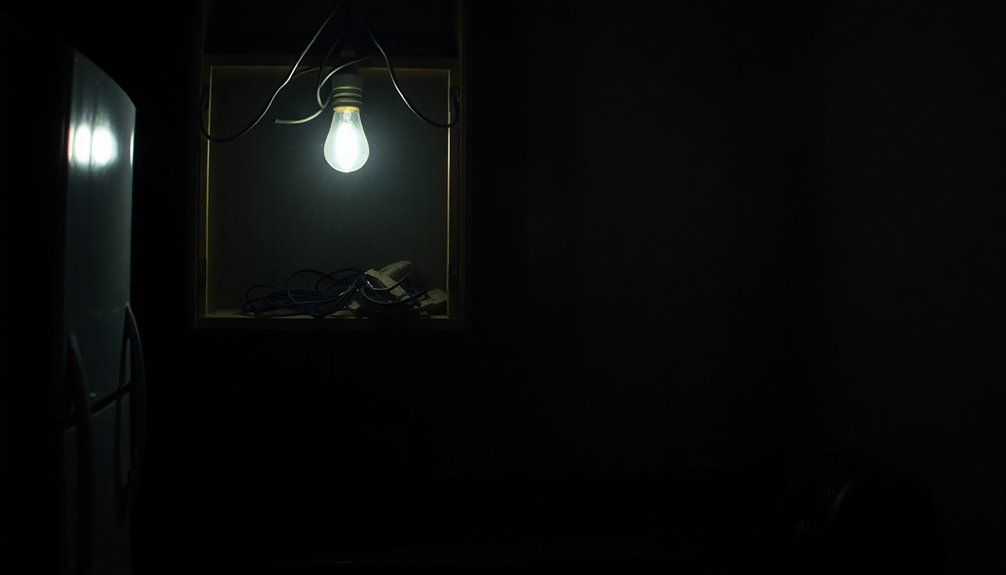
When you notice a burning smell in your house, it's vital to act quickly and understand what might be causing it. A burning smell coming from your home can indicate serious electrical issues or overheating components.
These odors, especially if they resemble burnt plastic, can lead to fires if not addressed promptly. You should immediately try to identify the source of the smell; check for overheated wiring, malfunctioning appliances, or foreign objects caught in your heating system.
If the smell persists, turn off the main power to your home to mitigate the risk of fire while you wait for professional assistance. Remember, distinct odors from burning dust when you first activate your heating system are often harmless, but they should dissipate quickly. If they don't, further investigation is necessary.
Overloaded circuits or faulty outlets can also produce these burning smells, which is why regular electrical maintenance is essential for ensuring your home's safety.
If you suspect an electrical issue, don't hesitate to call an electrician. Taking these steps can help protect your home and keep you and your loved ones safe.
Common Causes of Burning Odors
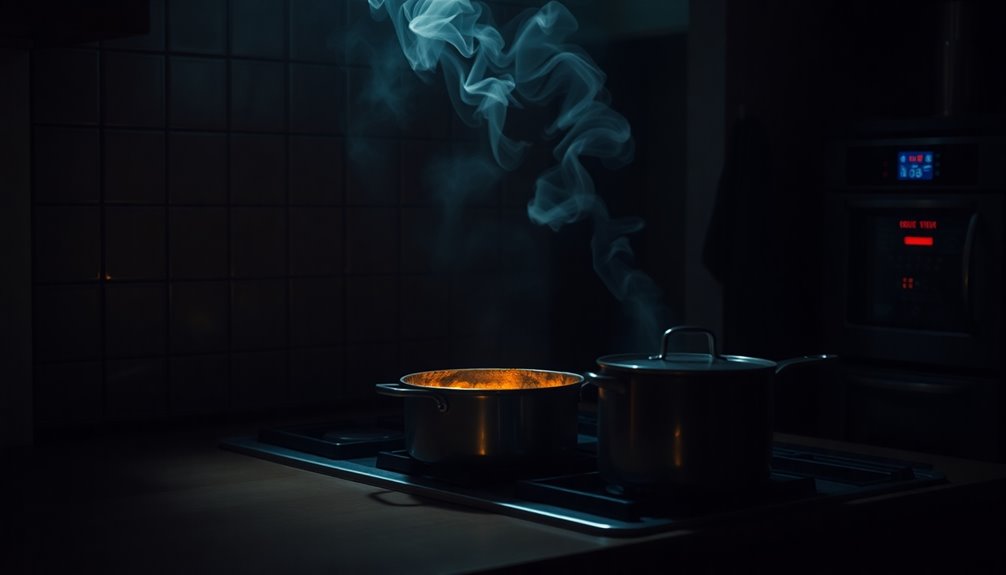
A burning odor in your home can stem from several common issues that require immediate attention. One major culprit is overheating electrical components, which can occur from frayed wires or overloaded circuits. These situations pose a serious fire risk, so don't ignore them.
Malfunctioning appliances might also be the source, as melting plastic or overheating parts can produce distinct smells. If you detect a burning odor near any appliance, it's time to unplug it and investigate further.
Dust accumulation on heaters or HVAC systems can lead to a burning smell when activated. While this smell usually dissipates quickly, persistent odors warrant an inspection.
Additionally, overheating light ballasts in fluorescent lights can signal the need for replacement, as they may cause potential electrical fires.
If you notice a burning smell near electrical outlets or switches, it could indicate loose connections or circuit overloads. In such cases, it's essential to contact a qualified electrician for a thorough evaluation.
Always keep a fire extinguisher on hand, just in case. Recognizing these common causes of burning odors can help keep you and your home safe.
Electrical Issues to Investigate
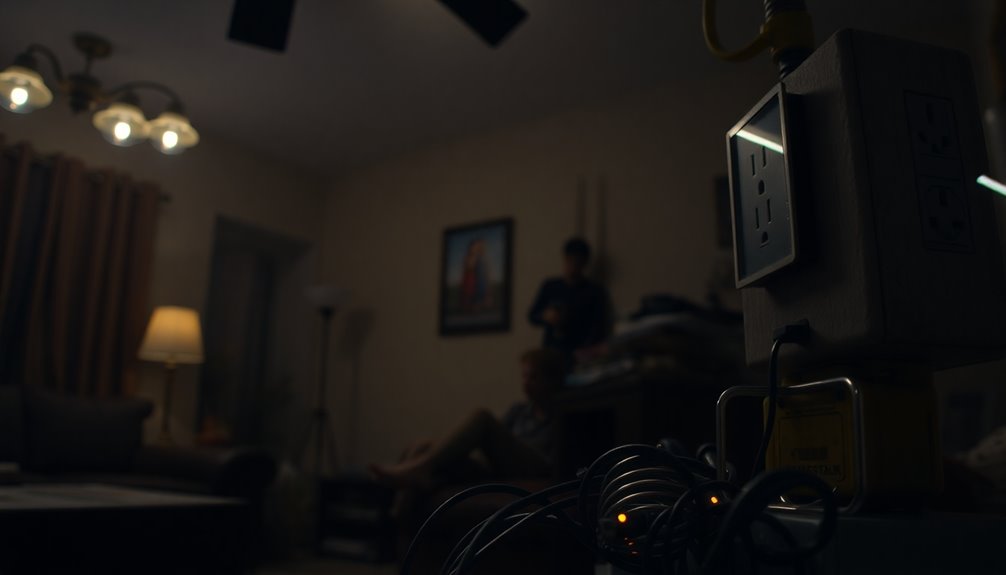
Electrical issues often lurk behind the scenes, waiting to cause major problems. A burning smell without visible smoke often points to overheating electrical components, like frayed wires or overloaded circuits, which greatly heighten fire risk. Here's a quick reference to help you identify potential electrical issues:
| Signs to Look For | Action Required |
|---|---|
| Burning smell from outlets | Immediate inspection by a pro |
| Overheating light ballasts | Replace or inspect bulbs |
| Ozone-like scent present | Urgent professional attention |
| Darkened or flickering bulbs | Check for loose connections |
Make it a point to check outlets and switches for burnt odors, as these often signal overheating due to loose connections or circuit overloads. Overheated light ballasts can produce distinctive burning odors, so visual checks for darkened bulbs are essential. If you notice that burning smell accompanied by an ozone-like scent, don't wait—call a professional immediately. Regular maintenance and prompt investigation of any unusual electrical odors can prevent dangerous situations and guarantee the safety of your home. Stay alert and proactive! Additionally, be aware that proper electrical maintenance can significantly reduce the risk of such issues.
Importance of Immediate Action
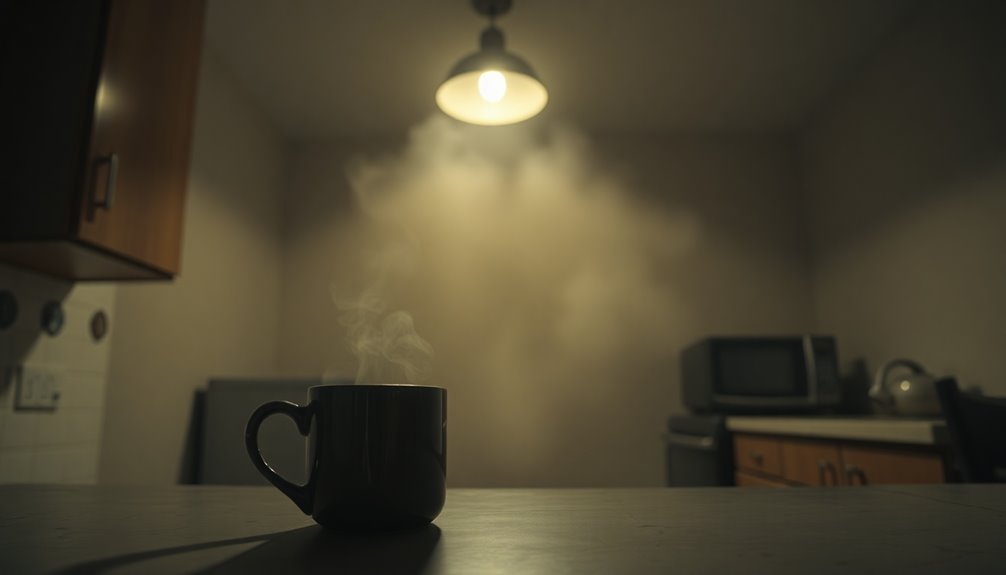
Ignoring a burning smell in your home can lead to dire consequences. That seemingly harmless odor might signal overheating electrical components or wiring issues, which pose a significant fire risk. If you don't take immediate action, you could face severe electrical damage, increased repair costs, or even property loss due to a potential fire.
First, turn off the main power supply to mitigate any risk of further overheating. Then, seek professional assistance to investigate the source of the burning smell. Promptly identifying and addressing the issue can prevent it from escalating into a full-blown fire, ensuring the safety of everyone in your home.
Regular maintenance of your electrical systems and appliances is crucial. It helps detect early signs of overheating or malfunction, reducing the chances of dangerous burning odors in the future.
Don't underestimate the seriousness of a burning smell; it's not just an annoyance but a warning that should never be ignored. Taking swift action could save your home and protect your loved ones from potential hazards. Remember, safety is always worth the effort.
Safety Precautions to Consider
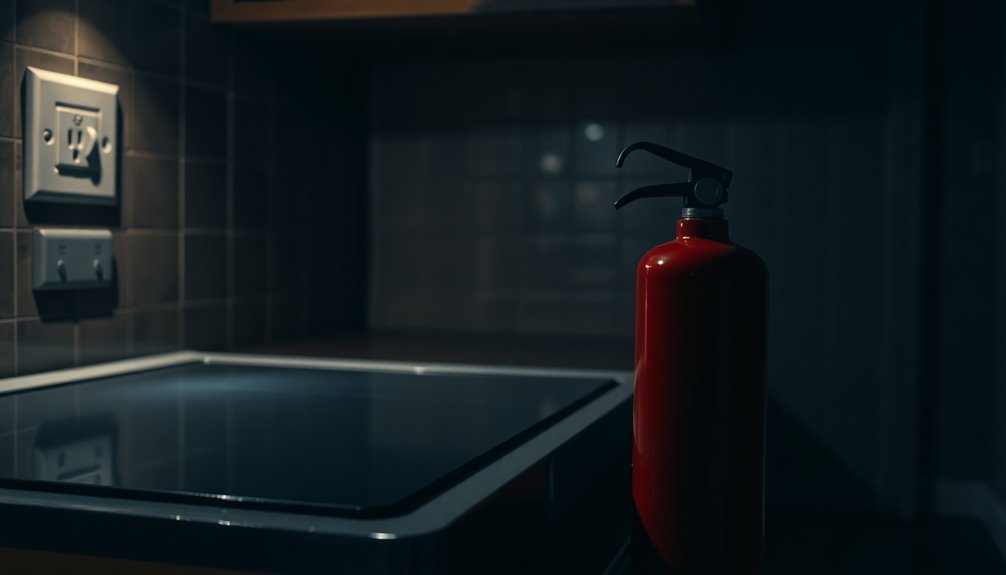
Taking proactive safety precautions is essential when you notice a burning smell in your home. First, shut off the main power immediately and avoid using any electrical devices. This action can help prevent potential fire hazards linked to faulty electrical components.
Consider these safety precautions:
- Keep a fire extinguisher accessible, especially near areas with electrical appliances.
- Schedule regular inspections of your electrical systems, including outlets and wiring, to catch issues before they escalate.
- Make certain smoke detectors are functional and have fresh batteries for early warnings.
- If the smell persists, immediately call a professional for a thorough assessment of your electrical system. Utilizing real-time monitoring systems can also help detect any electrical anomalies that could lead to dangerous situations.
If you suspect a fire, don't hesitate to call the fire department or emergency services. Addressing the situation quickly can prevent dangerous incidents.
When to Call a Professional
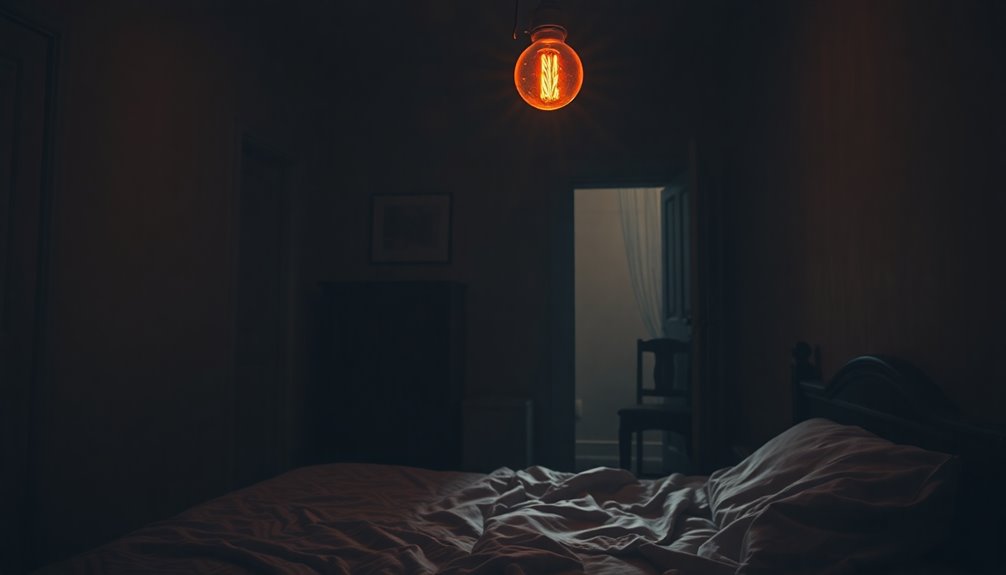
When should you call a professional about a burning smell in your home? If you notice a persistent burning smell without any visible smoke, it's essential to act quickly.
First, turn off the main power to prevent potential electrical fires and then contact a licensed electrician immediately. A burning smell, especially one resembling plastic or electrical components, often indicates overheating wiring or faulty outlets that require professional inspection.
If the smell in your home lingers even after you've checked and replaced air filters, it might signal deeper issues within your heating units or electrical components.
Don't hesitate to reach out to an HVAC technician if you suspect problems with your heating system. Additionally, consider installing a home security system to monitor for unusual activity that could indicate underlying electrical issues.
In cases where the burning smell is strong or accompanied by unusual electrical behavior, such as flickering lights, evacuate the premises and call emergency services right away.
Regular maintenance checks by qualified professionals can help identify and resolve underlying electrical issues before they escalate.
Identifying Other Concerning Odors
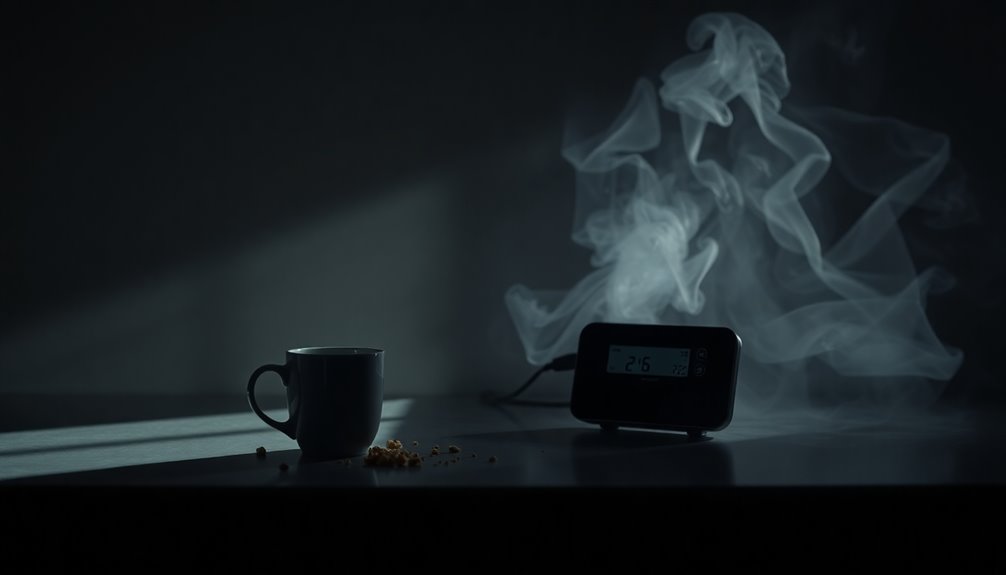
Identifying other concerning odors in your home is essential for maintaining a safe environment. While a burning smell can indicate serious electrical issues, you should also be aware of other distinctive odors that may signal health risks or system failures.
Here are some smells to watch for:
- Fishy odor: This could mean overheating electrical parts; don't ignore it—call an expert immediately.
- Musty smell: Often linked to mold or mildew growth, which can trigger health issues and should be addressed promptly.
- Chemical scent: A strong chemical smell might indicate gas leaks or hazardous material spills; evacuate the area and seek help.
- Foul odor from HVAC system: Unpleasant smells from your HVAC system can suggest dirty filters or burnt components, requiring maintenance.
If you ever smell smoke without visible signs, investigate immediately. Additionally, using air purifiers can help capture harmful pollutants and improve indoor air quality, further ensuring a safe living environment.
Regularly inspecting your home's electrical systems and HVAC components can help catch these problems before they escalate into dangerous situations.
Prioritizing safety means being proactive about identifying these odors and taking appropriate action.
Preventative Measures for Your Home
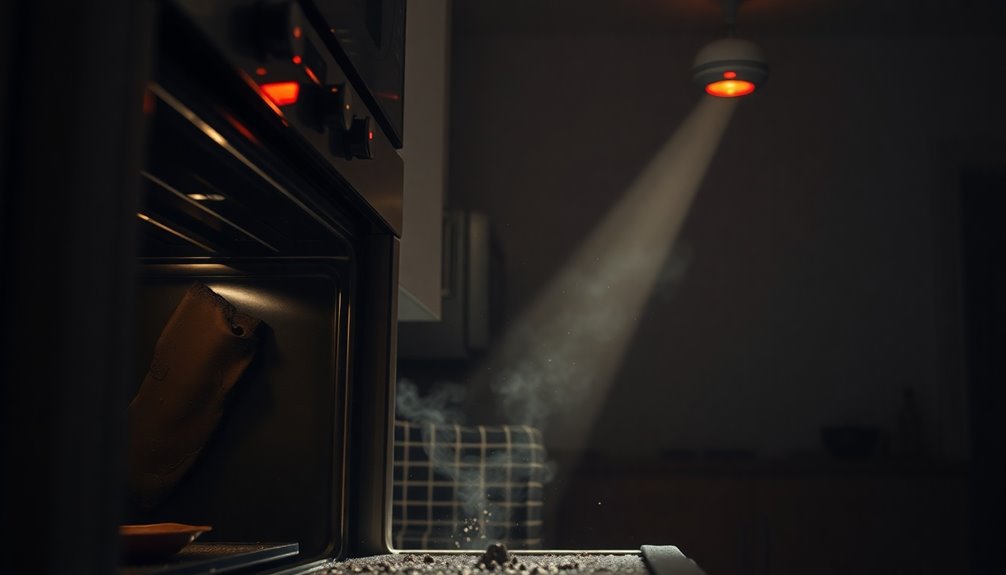
Recognizing and addressing concerning odors in your home is just the beginning of maintaining a safe environment. To further protect your household, implement these preventative measures:
| Action | Purpose |
|---|---|
| Inspect and replace air filters | Prevent overheating and improve airflow |
| Schedule annual maintenance checks | Identify electrical issues before they escalate |
| Keep flammable materials away | Reduce fire hazards near electrical outlets |
| Install smoke and carbon monoxide detectors | Guarantee early detection of potential dangers |
Make it a point to call your gas company if you ever suspect a gas leak or experience unusual smells. Regular professional cleaning of your heating unit can also help maintain its efficiency and safety. Equip your home with functional smoke detectors, testing them monthly to verify they work. Educate everyone in your home on recognizing burning smells, and establish a protocol for immediate reporting. Taking these steps can considerably reduce the risk of hazards and help you maintain a safe, comfortable living environment. Additionally, ensuring proper airflow around the unit can enhance the performance of your air purification systems.
Resources for Home Safety
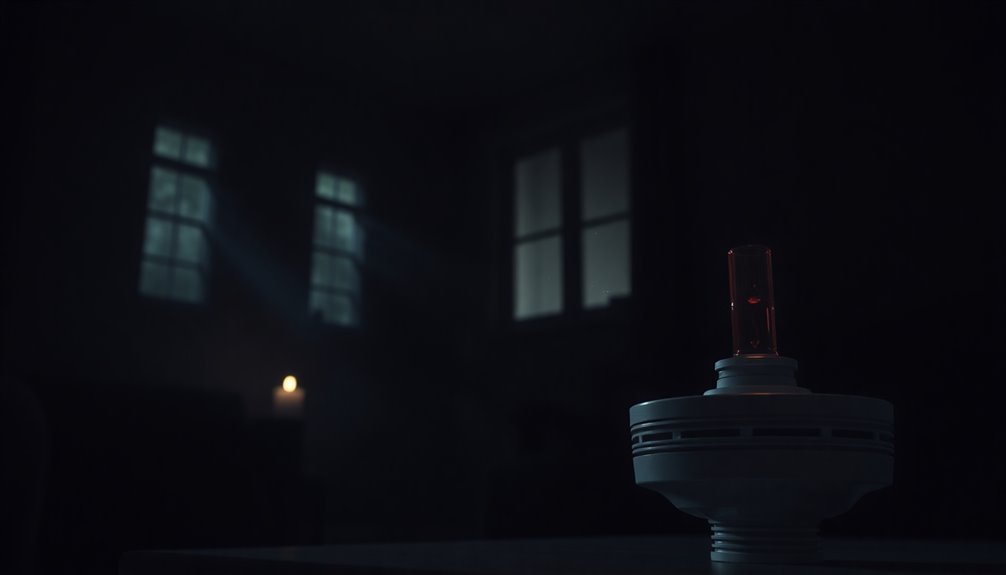
When it comes to home safety, having the right resources on hand is vital.
Make sure you've got emergency contact information easily accessible, and consider investing in essential safety equipment like smoke detectors and fire extinguishers.
These steps can help you respond quickly and effectively in case of any emergencies.
Emergency Contact Information
In an emergency, having quick access to contact information for local fire departments and utility companies can make all the difference.
If you notice a burning smell in your house without visible smoke, it's crucial to react swiftly. Evacuate the premises immediately and be prepared to contact the right professionals.
Keep a list of emergency contacts handy, including:
- Local fire department: For immediate assistance with potential electrical fires.
- Local gas company: Essential if you suspect a natural gas leak.
- Licensed electrician: Contact them if burning odors are near outlets, switches, or appliances.
- Local emergency services: For any urgent situations requiring assistance.
Having this emergency contact information readily available allows you to act quickly and mitigate hazards. Additionally, consider using an air purifier to help improve indoor air quality and reduce harmful airborne particles.
Regularly inspect and maintain your electrical systems and appliances to reduce the risk of burning odors and associated dangers.
Remember, your safety is the top priority, so don't hesitate to reach out for professional help when you sense something is wrong.
Stay informed and prepared, and you'll be better equipped to handle any situation that arises in your home.
Safety Equipment Recommendations
Safety equipment is essential for protecting your home and loved ones from potential hazards. Start by installing smoke detectors in every room and on each level of your house. Test them monthly and replace the batteries at least once a year to verify they're functioning properly.
Don't overlook the importance of carbon monoxide detectors, especially near sleeping areas, as this odorless gas can come from faulty heating lines and can be deadly.
It's also a good idea to keep a fire extinguisher accessible in key areas like the kitchen and garage. Make sure everyone in your household knows how to use it effectively in case of emergencies.
To identify potential fire hazards before they escalate, consider utilizing thermal imaging cameras to detect overheating electrical components.
Lastly, regularly inspect and maintain your appliances, like stoves, and electrical systems. Perform routine checks on your HVAC units, as neglecting these can lead to burning odors and serious risks. Additionally, monitoring credit card statements can help you identify any unusual expenses that might indicate a fire-related incident or equipment failure.
Taking these steps can help you create a safer environment and give you peace of mind knowing you're prepared for any emergency.
Frequently Asked Questions
Why Does It Smell Like Something Is Burning in My House but Nothing Is Burning?
If you smell something burning in your house but see no smoke, it's likely due to overheating electrical components or accumulated dust.
Check your appliances and light fixtures for unusual odors, as older wiring can cause malfunctions.
Sometimes, dust burns off heating elements, creating temporary smells.
Don't ignore persistent odors; they can indicate a serious issue.
It's best to contact a qualified electrician to inspect your home and guarantee everything's safe.
Why Does My House Have a Mystery Burning Smell?
If your house has a mystery burning smell, it could be due to overheating electrical components or frayed wires.
Sometimes, foreign objects in your ductwork or debris in your heating system create these odors.
If you notice the smell after using your heater for the first time in a while, it might just be burning dust.
However, if the smell persists, you should turn off the power and call a qualified electrician.
Can a Burning Smell Be a Ghost?
Imagine walking through an old library, the scent of ancient pages whispering tales of mystery.
Now, when you smell burning, it might feel eerie, but ghosts aren't the source. You're often dealing with something much more tangible, like faulty wiring or overheated appliances.
Don't let your imagination run wild; that smell could signal a serious hazard. Check your electrical systems first—your safety is what truly matters, not the supernatural.
What Does the Smell of Fire Mean Spiritually?
The smell of fire often carries spiritual significance. It can symbolize purification or transformation, urging you to release negative energy and embrace renewal.
You might feel it's a sign of spiritual awakening, guiding you on your path. This scent can represent the presence of ancestors, offering protection or communication.
Pay attention to your surroundings and inner feelings, as it may also signal the need to let go of old habits and beliefs for personal growth.
Conclusion
To sum up, don't ignore that burning smell; it's like a smoke alarm whispering a warning. Just like a friend who's trying to tell you something important but isn't loud enough, those subtle signs can lead to serious problems if overlooked. Take action immediately, whether it's investigating your appliances or calling a professional. Your home should be a safe haven, not a hidden danger zone. Stay proactive, and keep your space safe and sound!









